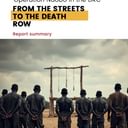
In this month’s episode of Discussions with DPIC, Managing Director Anne Holsinger speaks with John Bessler (pictured), Professor of Law at the University of Baltimore School of Law. Professor Bessler is the author of several books on the death penalty, including his 2023 book The Death Penalty’s Denial of Fundamental Human Rights: International Law, State Practice, and the Emerging Abolitionist Norm. In his most recent book, Professor Bessler argues that the death penalty should be classified as torture, which would prohibit its use under international law and treaties. The reality of capital punishment, he explains, is that it is “really just a series of credible death threats.” The capital charge is a death threat, the death sentence is a more credible death threat, and the execution itself is a very imminent death threat. International law already prohibits mock executions as a “classic form of psychological torture,” and Professor Bessler argues that the death penalty, with its repeated threats to execute, should be viewed the same way. “[T]here’s really no way to eliminate the psychological torment that is associated with scheduling someone’s death and then subjecting them to that continuous threat of death during the entire process.”
Professor Bessler notes that the US Supreme Court has held that the Constitution prohibits torture as a form of cruel and unusual punishment but has failed to consider the current use of the death penalty, and the lengthy period of time before an execution, as a form of torture. Recently, however, in Idaho, a federal judge preliminarily identified the repeated setting of executions for a death-sentenced prisoner without intent to carry them out as a form of psychological torture.
Defining the death penalty as a human rights issue is essential, according to Professor Bessler. “We do need to think about the death penalty as a human rights issue, squarely,” he said, just as European countries and international law instruments do. “The death penalty by nature makes use of credible death threats that ordinarily would be classified as both tortious and torturous” as well as criminal, he says. “Government officials should not be permitted to use credible death threats in an organized criminal justice system.”
“The idea of human dignity is one that we need to think about as well,” Professor Bessler adds. He says that in 1968, when Supreme Court Justice Blackmun was a judge on the 8th Circuit, he wrote that a non-lethal form of corporal punishment was degrading both to the person being punished and also to the punisher. The irony, Professor Bessler notes, is that a lethal form of punishment, the death penalty, has not been viewed the same way.
Listen to Discussions with DPIC: Classifying Capital Punishment as Torture with John Bessler
See Mr. Bessler’s new book, The Death Penalty’s Denial of Fundamental Human Rights: International Law, State Practice, and the Emerging Abolitionist Norm, here.


